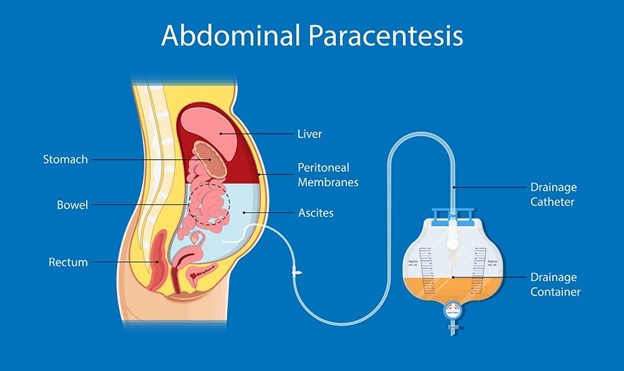A nurse is planning care for a group of clients. The nurse should expect to witness an informed consent for a client who will undergo which of the following procedures?
Administration of an enema.
Performance of a paracentesis.
Insertion of an indwelling urinary catheter.
Placement of an NG tube.
The Correct Answer is B
The correct answer is choice B: Performance of a paracentesis.
Choice A rationale:
Administration of an enema does not require informed consent in the same way that invasive procedures do. Enemas are typically considered routine nursing interventions and are not as invasive as the other options.
Choice B rationale:
This is the correct choice. A paracentesis is an invasive procedure that involves puncturing the abdominal cavity to withdraw fluid. Informed consent is required for procedures that carry potential risks, and paracentesis falls into this category due to the risk of complications such as infection, bleeding, or organ injury.

Choice C rationale:
Insertion of an indwelling urinary catheter is a common nursing procedure that, while invasive, does not typically require informed consent. However, the nurse should still explain the procedure to the client and obtain verbal consent, but it's not the same level of formal informed consent required for more invasive procedures.
Choice D rationale:
Placement of an NG tube, although uncomfortable, is not as invasive as a paracentesis. In most cases, NG tube placement is considered a medical or nursing intervention rather than a procedure that necessitates formal informed consent.
Nursing Test Bank
Naxlex Comprehensive Predictor Exams
Related Questions
Correct Answer is B
Explanation

The correct answer is choice b. Three-point.
Choice A rationale:
The four-point gait is used when a client can bear weight on both legs. It involves moving one crutch forward, followed by the opposite leg, then the other crutch, and finally the other leg. This gait provides maximum stability but is not suitable for non-weight-bearing conditions.
Choice B rationale:
The three-point gait is appropriate for clients who cannot bear weight on one leg. In this gait, both crutches and the affected leg move forward together, followed by the unaffected leg. This allows the client to keep weight off the injured leg while moving.
Choice C rationale:
The two-point gait is used when a client can bear partial weight on both legs. It involves moving one crutch and the opposite leg forward simultaneously, followed by the other crutch and leg. This gait is faster than the four-point gait but still provides some stability.
Choice D rationale:
The swing-through gait is used by clients who have good upper body strength and balance. It involves moving both crutches forward together and then swinging both legs forward past the crutches. This gait is not typically recommended for clients who need to keep weight off one leg.
Correct Answer is B
Explanation
The correct answer is choice B: Ask the client what they already know about meal planning.
Choice A rationale:
Using pictures of different food groups can be helpful in teaching about carbohydrate counting, but it's important to assess the client's current knowledge and understanding before introducing new information. Starting with this approach might overwhelm the client or duplicate information they already possess.
Choice B rationale:
This is the correct choice. Before providing education, it's crucial to assess the client's baseline knowledge. By asking the client what they already know about meal planning, the nurse can tailor the teaching plan to fill in any gaps and avoid presenting redundant information. This approach respects the client's current understanding and focuses on addressing their specific needs.
Choice C rationale:
Giving the client a brochure with sample menus can be helpful once the nurse has assessed the client's knowledge and educational needs. However, providing the brochure as the first action might not be effective if the client already has some understanding of meal planning or if the brochure does not address the client's specific questions.
Choice D rationale:
Involving the family in the discussion of the client's meal plan is important for long-term support, but it shouldn't be the first action. First, the nurse should ensure that the client's own understanding and preferences are addressed before considering input from family members.
Whether you are a student looking to ace your exams or a practicing nurse seeking to enhance your expertise , our nursing education contents will empower you with the confidence and competence to make a difference in the lives of patients and become a respected leader in the healthcare field.
Visit Naxlex, invest in your future and unlock endless possibilities with our unparalleled nursing education contents today
Report Wrong Answer on the Current Question
Do you disagree with the answer? If yes, what is your expected answer? Explain.
Kindly be descriptive with the issue you are facing.
